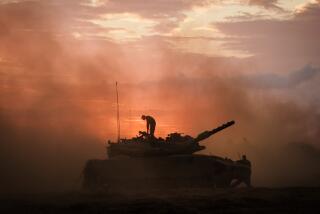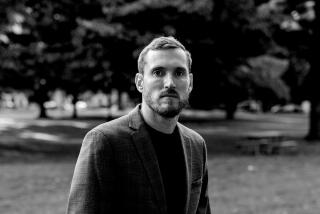Masood Khalili
- Share via
Masood Khalili, 56, Afghanistan’s ambassador to India, was one of only two people to survive the blast engineered by Al Qaeda operatives that assassinated legendary Northern Alliance leader Ahmed Shah Masoud on Sept. 9, 2001, two days before the terrorist attacks on the United States. The son of a famous poet and a believer in a mystical Islam called Sufism, Khalili was a close friend of Masoud for 23 years and still calls him “the Commander.” He was sitting between Masoud and a television camera packed with explosives. The explosion left Khalili blind in his right eye, deaf in his right ear and badly burned over much of his body, which was peppered by about 1,000 pieces of shrapnel. About 300 pieces are still in his left leg.
*
“Two or three days before I was supposed to go to Afghanistan, the Commander called me and rushed me. He said, ‘You have to come and see me.’ I told him, ‘Of course.’ But I doubted him. I said, ‘If it’s not important, I can come a week later.’
He said, ‘No, no. If you are standing, run. If you are sitting, stand and run.’ The next day, I was on the way. And wherever I was in Afghanistan, I was with him.
On Sept. 8, after 11 at night, he said to all of his commanders, ‘OK. Everyone should go. Khalili and me have something to talk about.’ We were the only ones on the whole bank of the Oxus River, with a single, small lantern burning, two of us lying down on mattresses on the floor, staring at the ceiling and talking, going through the past: the war against the Soviets, the first time we met. It was like a film that you go back to and rewind, and try to see as much as possible, sometimes fast, sometimes slow, and pausing--and laughing.
He had a book by the greatest Persian poet Hafiz, a Sufi. It is fantastic poetry. No one has been able to challenge it in the last 700 years. The tradition is that people wish something, and then they open that book, and whatever comes, they say, ‘Aha! This is what Hafiz says about the future.’
The Commander loved poetry, and he knew I loved to read it. He told me, ‘I’ll wish; you open the book.’ I opened the book, put my finger on the page, and the first or second verse of the ghazal said: ‘Oh, you two who are sitting tonight together, value this night. Many years will pass: Nights will go, years will come, months will disappear. You two will not have this night again. Value it.’
We stayed quiet, without exaggeration, for at least 10 minutes. I don’t know what he was thinking, or what I was thinking. We were both just quiet.
The next morning, we were seated side by side, so close that I could feel the warmth from his shoulder. He looked at something on the table and said, ‘What is that?’ ‘It is my passport,’ I told him. ‘It won’t fit in my pocket.’ I tried to put it in my left shirt pocket and it wouldn’t fit, and then he came closer to me. He pushed it, and it went in.
Then he told me, ‘Let’s go to the next room. Two Arab journalists have been waiting for a week or 10 days.’ When I heard Arabs, I was really reluctant and said, ‘You go. I have to wash.’ And he said, ‘No, no, no. You have to go with me.’
Those two Arabs came in, and after hearing the smallest one say, ‘I do not represent any paper, I belong to Islamic centers based in Paris, London--all over the world,’ I whispered to the Commander, ‘They are not journalists. They belong to that.’ I didn’t mention Al Qaeda because I knew the Commander knew what I meant by ‘that.’
He asked them, ‘Tell me some of your questions, and then I will answer.’ It was his habit. Out of 15 questions, eight were about Osama bin Laden, questions like: ‘Why are you against him? Why did you say he was a killer?’
‘OK, start your camera,’ the Commander said, and his chin was down on his chest. I could tell he was not in a good mood.
The Arab asked the first question of the interview: ‘What is the situation in Afghanistan?’ I translated into Persian. I spoke just half of the first letter of the first word of the first question, and boom!
For the next three minutes, I was fully conscious--more conscious than ever--and it seemed like an hour.
Everywhere there was fire. The worst thing was the smell. With that smell, everything went inside me: the fire, the smoke--everything. That was when I realized, ‘Not only your friend might die, you could too.’ That was my first taste--the smell--of dying.
Others told me later that I was shouting loudly, ‘Oh God, save me! You have always been with me. In this time of difficulty, save me. Liberate me!’ Then I felt a hand on my wrist. That was the last touch of the Commander. In the echo of my prayers, he died.
What a man he was. I still don’t believe he is dead. No. He is alive. At least, every day he is alive for me in my memories. I have to cry whenever I remember him, not because of terrorism, but because I love him. Others look, to me, like foot soldiers. He looked like a general. And there is a vacuum now.
My wife said she found eight bits of shrapnel embedded in the pages of my passport. It saved my heart. Ten times a day, I ask the question, ‘Why did I live?’ I haven’t found the answer.
I don’t see the power of death now. I was once scared of death. I’m not saying I’m so brave against death now. I just say, ‘OK, fine. Come again.’ ”
*
As told to Paul Watson
More to Read
Sign up for Essential California
The most important California stories and recommendations in your inbox every morning.
You may occasionally receive promotional content from the Los Angeles Times.













